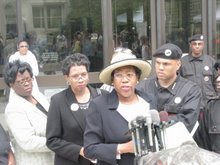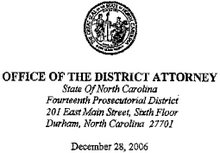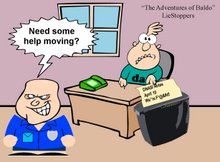The Nifong Law
“Mr. Ethridge was stripped of his law license last Friday by the North Carolina Bar Association, due to a 2001 incident in which he put an elderly woman's life savings in his bank account, while he was serving as a lawyer in Smithfield..“Though Mr. Ethridge was scheduled to hold court in Johnston County today, he will not be sentencing anyone for a while. According to District Court Judge Andy Corbett, Mr. Ethridge has been taken out of the rotation.."I have been instructed by the administrative office of court to not assign him to court," Judge Corbett said. "He can still appeal it, he will still draw his pay, but he just will not be assigned to court while his case is pending. He will not be holding court until further notice."
“In 2001, Ethridge met Rosalind Sweet, a retired schoolteacher who was battling Alzheimer's disease. A neighbor has said Sweet thought Ethridge was her boyfriend. Over the course of several months, Sweet deeded her home to Ethridge and handed over her life savings of $14,249. During that period, a social worker found her living in a home without running water, her kitchen cupboards bare..“Ethridge told a committee of the State Bar in October that Sweet begged him to safeguard her assets from relatives wanting to put her in a nursing home and take her money. Ethridge said he agreed to help just to be kind..“During the fall of 2001, Ethridge used Sweet's money to upholster a chair in his office and cut checks to his wife and for cash. Months later, he handed over an envelope with Sweet's name on it, full of cash, for a pastor to hold, according to records and testimony presented during the State Bar hearing..“Ethridge returned the final $2,250 he owed Sweet's estate a month before the State Bar hearing.”
“A judge who lost his law license and can no longer hear cases is still drawing thousands of dollars on the state payroll -- and will continue until someone figures out how to get rid of him.."The N.C. State Bar stripped James Ethridge of his law license in October after deciding he had swindled an ailing, older woman of her home and life savings while he was a lawyer in 2001. Ethridge was elected to the district court bench in 2004, where he handled a busy caseload of criminal and domestic and child custody disputes in Johnston, Harnett and Lee counties.."Without a law license, Ethridge is barred from holding court and signing orders. But he is not barred from keeping the job. Getting Ethridge off the bench has become a "real quagmire," said Pamela Weaver Best, deputy counsel for the state Administrative Office of the Courts. Best said she can't recall the state agency ever having to force a judge off the bench because he's been disbarred.."We don't have a road map of how to proceed in a situation like this," said Paul Ross, executive secretary for the state's Judicial Standards Commission, the disciplinary board for judges. "No one anticipated something like this. You just don't think judges are going to get disbarred."."On Oct. 10, the head of the Administrative Office of the Courts, which oversees judges, clerks and other state court personnel, told him he couldn't hold court. Taxpayers have paid $9,300 to hire substitute judges to cover his shifts, according to AOC records. They're also responsible for 31 lunch tabs and reimbursed mileage for the emergency judge's trips to courthouses in Smithfield, Lillington and Sanford.."The state has also deposited salary of more than $25,000 into Ethridge's bank account for work he couldn't do.."There's no end in sight. The state may be forced to pay Ethridge's annual salary of $101,376 until his term as judge ends in December 2008."
"An embattled District Court judge decided to resign Wednesday rather than continue to be paid for a job he couldn't do.
...
"The move came two days after state officials admitted they didn't know how to remove him from the bench even though the N.C. State Bar has stripped him of his law license. Ethridge, who was elected judge in Johnston, Harnett and Lee counties in 2004, will officially step down Tuesday, he wrote in a letter to be delivered to the governor this week.
"James made this decision because it was the right thing to do in light of the controversy," [Alan] Schneider [another Ethridge attorney] said Wednesday night. "It was not because of the pressure."
“On Tuesday night, the Johnston County Republicans who helped carry him to the bench urged him to make a "prudent" decision. On Wednesday, the state and county Democratic Party called on Ethridge to resign immediately.”
Reference to CommitteeNormally, when a bill is introduced, the Chair of the Rules and Operations of the Senate Committee for Senate bills and the Speaker of the House of Representatives for House bills name a committee to which the bill will be assigned for careful study and recommendation. If the committee approves the bill, it reports this fact and the bill is placed on the calendar - the daily schedule of business - for consideration by the full membership of the body. Changes to the bill called "amendments" may be recommended by the committee or may be proposed by any member from the floor.Consideration by First HouseWhen the time comes for a consideration of the bill by the full membership of the house (Senate or House of Representatives), the Chair will recognize the sponsor of the bill or the chair of the committee which recommended the bill for passage. That person will explain the bill, and then any member who wishes to speak for or against the bill will be heard. Sometimes there is lengthy and heated debate; sometimes there is virtually no debate at all. After all who wish to be heard have spoken, a vote is taken. If the vote is favorable, the bill is said to have passed its second reading and moves to its third and final reading, at which time there may be more debate.Consideration by Second HouseAfter a bill has passed its third reading in the house in which it was introduced, it is sent to the other house, where it goes through the same process as in the first house - that is, it is referred to committee, and if approved, is debated and voted on at the second and third readings on the floor.Concurrence in AmendmentsIt often happens that the second house will make changes in a bill which was passed by the house in which the bill originated. In such cases the bill must be returned to the house of origin with a request that that body concur in the changes. If the original house does concur, the bill is ready to be enrolled and signed into law. If the original house objects to the amendments adopted in the other house, the two presiding officers may appoint members to a conference committee which seeks to reconcile the differences between the two houses. If the committee can agree upon the disputed subject, the committee reports to each house, and the two houses vote on the recommended text. If either house rejects the conference committee's recommendation, new members to the conference committee may be appointed to try again, otherwise the bill is defeated.Enrollment, Ratification, and PublicationAfter a bill passes both houses, it is enrolled. A clean copy, including all amendments, is prepared, with space for the signatures of the two presiding officers, and the governor, if necessary. The enrolled copy is taken to each presiding officer during the daily session. Each officer signs the enrolled copy. When the second signature is affixed, the bill is said to have been ratified. If the bill is a local law, it becomes law at that point. In November 1996, the citizens of North Carolina voted to amend the State Constitution to allow for a gubernatorial veto (Section 22 of Article II of the North Carolina Constitution). All Public Bills other than bills making appointments, proposing constitutional amendments, or revising districts are presented to the Governor on the day following ratification for the Governor's approval or veto. If the Governor signs the bill or takes no action on the bill within ten days after presentation, the bill becomes law. After adjournment of the General Assembly, the Governor has 30 days to act on a bill. The Governor is required to reconvene the General Assembly if a bill is vetoed after adjournment, unless a written request is received and signed by a majority of the Members of both houses that it is not necessary to reconvene. If the Governor vetoes a bill, the bill is returned to the original house where 3/5 of present and voting members can vote to override the veto. If the original house votes to override the veto, the bill is sent to the second house where 3/5 of present and voting members must also vote to override the veto before the bill can become law. After it becomes law, the term "bill" is no longer used. The enrolled act or law is given a chapter number and is published under that number in a volume called "Session Laws of North Carolina."














































7 comments:
I sincerely hope Nifong gets nifonged for his judical abuse. He has caused tremendous stress to many families. He is an embarrassment to his our family.
Nifong Nifong!!!
I served in the General Assembly before the Gov had the Veto. A bill can be passed in less than 10 days. I've seen it done. NC removed itself from the SE Banking compact so that NCNB could buy a Texas Bank. The bill went through like Sh*t through a goose and only 10 people even knew what the bill said. Remember this is a one party General Assembly and the Gov is in that party too. Get Mikey gone quick so people will forget he was a Democrat.
Kemp
Thanks Liestoppers!
I see!
Hudson delays, Mikey collects pay longer. Sounds like they're wasting Beth's tax dollars!
Once Mike is disbarred maybe he can get a job as a social worker ( a prior job he held), and save all the unwed prostitues with children in NC.
How is this not automatic? Why isn't it already the law that those public servants who require certification to do their job lose their jobs immediately upon losing certification?
This problem of how to eject government lawyers unable to fulfill their duties due to lack of necessary licensing is another example of the gaffe that NC law is, and it's just what happens when Democrats run a state. We see it in NJ, LA, and now it has bared its teeth in NC. The self-dealing lawyers of the legislature have made it virtually impossible to fire one of their own kind cemented in the public trough. My guess is that they will drag their feet until this is over and people forget. With the submission of this bill, the legislature is in the desirable position of being able to say they are taking care of it. When the strange case of Mike Nifong blows over, the bill will be cast upon the ash heap of alleged good intentions. Democrats always take care of their political brethren.
What has always concerned me about this case is that I can hardly believe that it stands alone in Nyfong's office. I think he may have "misprosecuted" before and gotten away with it. An enterprising local reporter might start to look at other cases. There is clear evidence of the bias of cops, especially the one who jumped into this case (Liebowitz???). I also think that the Gellar (sic) case served as a matrix for other prosecutorial misconduct. What you guys have been revealing in your blogs is the surrounding atmosphere--Duke faculty and students--that made this case literally obscene. But start looking around. Wanna bet you won't find dirt?
Post a Comment